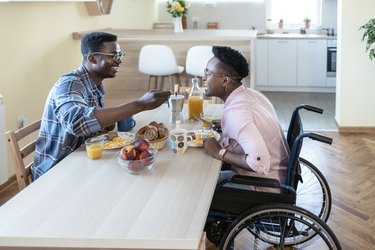
Anyone who's ever been hit by a hounding case of the hiccups after eating (we're guessing most people!) knows how pesky and persistent they can be.
Hiccups happen when your diaphragm — the muscle that separates your chest from your stomach, which is integral for breathing — spasms involuntarily, according to the Mayo Clinic. Every time it spasms, your vocal cords close, creating the characteristic "hic" sound.
Video of the Day
Video of the Day
So, what causes hiccups after eating? We spoke to gastroenterologist Elena A. Ivanina, DO, MPH, to get the 411 on post-meal hiccups, including why you get them, how to prevent them and what you can do to manage them once they strike.
Tip
A fleeting fit of hiccups is harmless, but if your hiccups persist longer than 48 hours (or they disrupt your ability to eat, sleep or breath), see a doctor, as this may be a sign of an underlying medical condition, per the Mayo Clinic.
1. You Ate Too Fast
We've all been there: so hungry that we hurry to fill our bellies with food. But rushing may be responsible for your spell of hiccups.
Here's why: "Eating too fast introduces a lot of air/gas into your stomach," which then expands, Dr. Ivanina says. And your stomach is located right next to your diaphragm, so when your belly bloats, it can trigger diaphragmatic contractions, aka hiccups, she says.
Fix it: Slow down. In this scenario, you can prevent hiccups after eating by taking a breath before each meal and setting an intention to eat slowly and mindfully, Dr. Ivanina says.
2. You Ate Too Much
Hiccups can also occur if you eat more than your stomach can handle.
"Eating too much fills up and distends your stomach," Dr. Ivanina says. And again, when your tummy expands excessively, it can trigger contractions in the neighboring diaphragm, she says.
Fix it: To help hinder hiccups, try limiting portion sizes, Dr. Ivanina says.
3. You Ate Something Spicy
Love spicy cuisine? Your hankering for hot food could be causing your hiccups.
While the connection isn't 100 percent clear, some folks find that zesty fare can bring on a bout of hiccups after eating, Dr. Ivanina says.
One theory is that certain fiery foods like chili peppers — which contain the compound capsaicin — can irritate the diaphragm, sending it into spasms.
Fix it: If you suspect spicy foods are the source of your hiccups, try cutting down on them to see if your problem diminishes, Dr. Ivanina says.
Capsaicin-Rich Foods
It may also be wise to limit or avoid other peppers that contain capsaicin, such as:
- Carolina Reapers
- Ghost peppers
- Habaneros
- Thai peppers
- Cayenne
- Tabasco
- Serrano peppers
- Jalapeños
- Poblanos
4. You Drank Something Carbonated
Those little bubbles in your beverage may be upping your odds of acquiring hiccups.
"Carbonated beverages are fluid with CO2 under pressure, and this gas expands in your stomach," Dr. Ivanina says. And if your belly swells a lot, it may trigger diaphragmatic contractions, she explains.
Fix it: Cut down on the carbonation by sticking to non-bubbly drinks like water and tea.
5. You Drank Alcohol
Believe it or not, your cocktail could be the cause of your hiccups.
That's because booze may irritate your esophagus and stomach, Dr. Ivanina says. And this could lead to a domino effect that aggravates the diaphragm and, ultimately, develops into hiccups, she says.
To make matters worse, if you're drinking a carbonated alcoholic beverage such as beer or champagne, you may double the chances of coming down with a case of diaphragmatic contractions.
Fix it: Once again, moderation is key: You can avoid an attack of hiccups by limiting your liquor intake, Dr. Ivanina says.
6. Your Food Is Too Hot or Cold
If you've ever sipped on something very hot (or icy cold) and found yourself battling hiccups afterward, here's why: "Extreme temperatures can irritate the esophagus or stomach, which may cause a related spasm of the diaphragm," Dr. Ivanina says.
Fix it: To prevent hiccups from happening, wait until your food's temperature levels off a bit.
Tip
Some medications are linked to hiccuping, like chemotherapy and steroids, per August 2018 research in Pharmacology & Pharmacy. Talk to your doctor if you're receiving either of these treatments and have persistent hiccups.
Other Tips to Manage Hiccups
If your preventive measures failed and you still ended up with hiccups (hey, it happens), there are still a few things you can do that may stop them swiftly.
While there's no scientific evidence to support the following strategies, some people have found the following tricks to be helpful in hampering hiccups, per the Mayo Clinic:
- Breathe into a paper bag
- Gargle with ice water
- Hold your breath
- Sip cold water
Is this an emergency? If you are experiencing serious medical symptoms, please see the National Library of Medicine’s list of signs you need emergency medical attention or call 911.